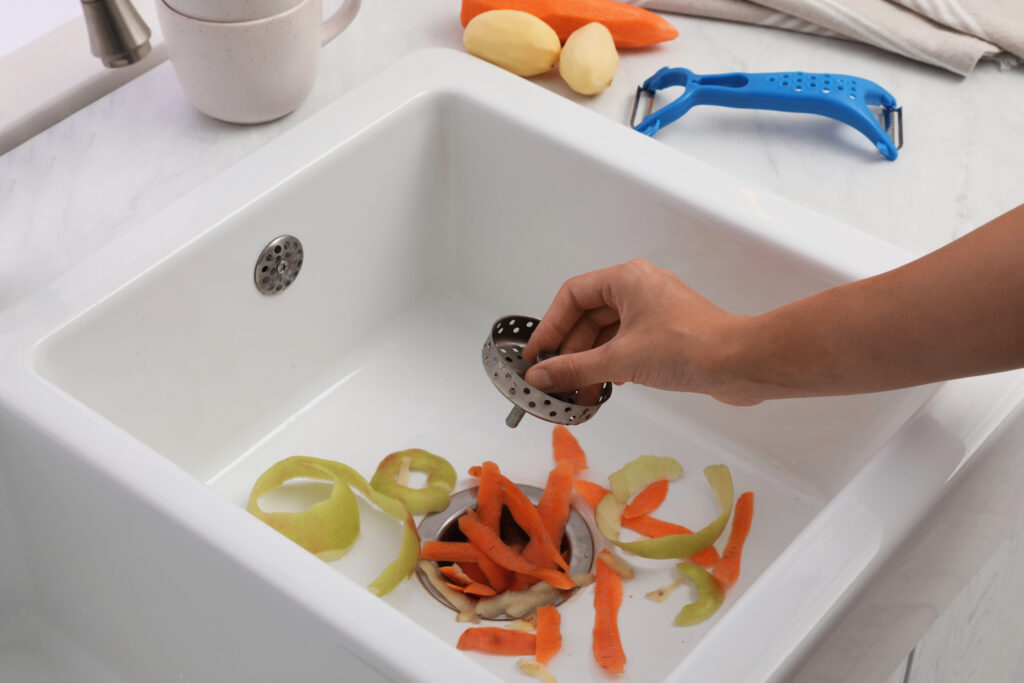By Dixie Somers
We all know how frustrating it can be to deal with a clogged kitchen sink or drain. These pesky obstructions not only disrupt our daily routines, but also contribute to larger environmental issues. In this guide, we'll provide you with simple yet effective tips on preventing kitchen clogs. By being mindful of what goes down your drains and implementing these preventative measures, you can save yourself from the hassle and expense of dealing with a clogged kitchen.
Know What Not to Put Down the Drain
One of the main reasons for kitchen clogs is improper disposal of food waste and other substances down the drain. This can include items such as cooking oil, grease, coffee grounds, eggshells, pasta, rice, and fibrous vegetables like celery or corn husks. These materials can easily cling to the inner walls of pipes and create blockages over time. To prevent this from happening, it's important to be mindful of what you're putting down your drains.
Use Drain Strainers
Another effective way to prevent kitchen clogs is by using drain strainers or stoppers in your sink and shower drains. These inexpensive tools catch larger debris and prevent them from entering your pipes. Simply empty the contents of the strainer into the trash or compost bin after each use, and you'll be amazed at how much less gunk ends up in your drains.
Drain strainers can easily be found at most hardware stores, home goods stores, and even some grocery stores or online retailers. When purchasing a strainer, make sure to choose one that will fit your drain size and is easy to clean. To care for your drain strainer, simply rinse it off after each use and remove any trapped debris. Regular cleaning will help prolong the life of your strainer and keep your drains clear.
Regularly Clean Your Drains
Don't forget to regularly clean your drains to prevent buildup of residue and potential clogs. One simple method is pouring a pot of boiling water down your drain once a week. You can also make a natural cleaning solution using equal parts baking soda and vinegar, letting it sit for 15 minutes before flushing with hot water. Just be sure to avoid using commercial drain cleaners, as they can damage your pipes and harm the environment.
While these preventative measures can greatly reduce the risk of kitchen clogs, sometimes they still occur. If you're dealing with a stubborn or recurring clog, it may be time to call in a professional plumber for drain cleaning services. They have specialized tools and techniques to effectively remove tough blockages without causing further damage to your plumbing system.
Install a Garbage Disposal
If you don't already have one, consider installing a garbage disposal in your sink. This device grinds up food waste into smaller particles that can easily pass through your pipes. However, be sure to use it properly by running cold water while using the disposal and avoiding hard or fibrous foods that may cause clogs.
The cost of a garbage disposal can vary depending on the brand, model, and features. On average, they can range from $50 to over $500. But investing in a quality disposal can save you money in the long run by preventing clogs and potential plumbing repairs. Be sure to carefully research and compare options before making a purchase to ensure you're getting the best value for your needs. So, it may be worth considering as a preventative measure against kitchen clogs.
Dispose of Cooking Oil Properly
You need to dispose of cooking oil and grease properly, as they can solidify and cause major clogs in your drains. Instead of pouring them down the drain, let them cool in a container and then dispose of them in the trash or recycle if possible.
Pouring cooking oil down the drain is not only bad for your plumbing, but it also has negative impacts on the environment. As it cools and solidifies, it can easily cling to pipes and create blockages. This can result in expensive plumbing repairs and even sewage backups.
Additionally, when poured down the drain, cooking oil and grease can enter our waterways and harm aquatic life. By properly disposing of these substances, we can prevent clogs and protect our environment.
Be Mindful of What Goes Down Your Disposal
For those with a garbage disposal, try to remember that they're not built to handle everything. Avoid putting hard or fibrous foods like bones, fruit pits, and corn husks down the disposal as they can cause major clogs. Be sure to run plenty of water before and after using the disposal to help flush out any remaining debris.
To keep your disposal running smoothly, be sure to regularly maintain and clean it. This includes running cold water while using the disposal, grinding up ice cubes to sharpen the blades, and periodically cleaning with baking soda and vinegar. Most importantly, be sure to read the manufacturer's instructions for proper usage and maintenance. By taking these steps, you can extend the life of your disposal and prevent potential clogs in your kitchen pipes.
By being mindful of what goes down your drains and implementing these preventative measures, you can save yourself from dealing with frustrating kitchen clogs. Remember to properly dispose of food waste and cooking oil, use drain strainers, regularly clean your drains, and be cautious of what you put down your garbage disposal. With these simple steps, you can help prevent clogs and do your part in promoting a healthier environment.
Dixie Somers is a freelance writer who loves to write for business, health and women’s interests. She lives in Arizona with her husband and three beautiful daughters.








